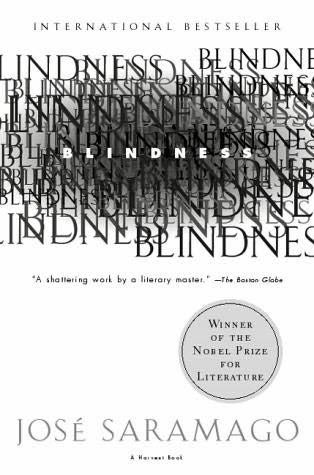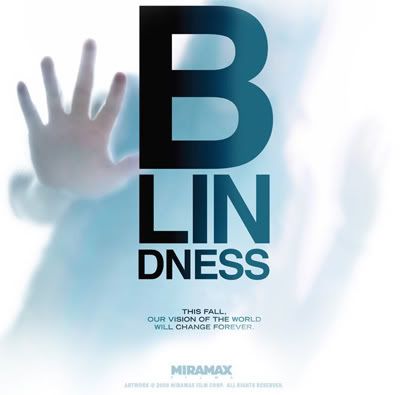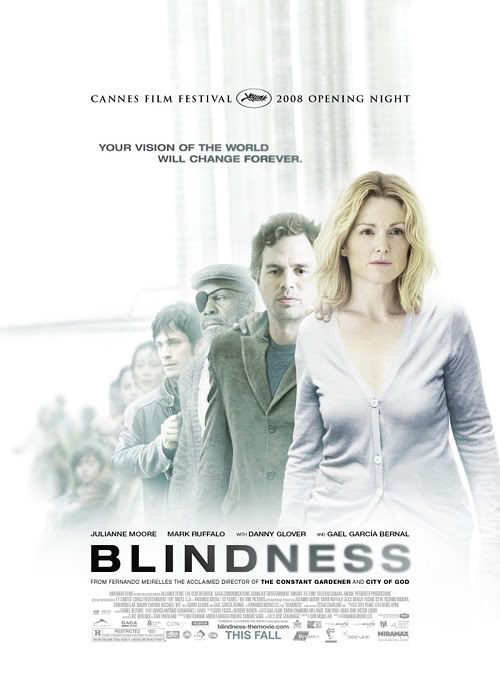Back in grade school, I was a Book It! beast, filling my pin with gold stickers on the reg. Granted, some of the time I was shamefully rephrasing the book's synopsis on the back cover, but whatever. Apples and oranges, that was. Either the teachers didn't care, or just didn't notice. But fairness meant little to an adolescent me since my reward for a pin full of stickers was a personal pan pizza at the heavenly Pizza Hut. And shit, when I was a kid, there was no great eating-out restuarant imaginable.
But what made Book It! so cool was that, when I didn't submit to slacker-syndrome and rewrite the synopsis, it was a program that inspired me to put down my magazines and horror comic books and actually read a piece of literature.
These days, I feel like I'm in the midst of an adult Book It! program, a self-imposed one. The first entry was Cormac McCarthy's outstanding The Road, which I read last month. And just this afternoon, I finished the second entry: Jose Saramago's international best-seller Blindness.

What both of these, as well as my upcoming slate of books-to-read, share in common is that movie adaptations are on the horizon. And I figure, what better way to form a well-rounded opinion of each respective flick than to read the original novel first? Makes sense to me, at least.
Blindness is amaing stuff. I was in love with The Road after reading it, and I still am, but now, Blindness has usurped The Road as my fave book. Of course, I've yet to read a staggering amount of literature, but I'm working on that, and thanks to the pair I've finished thus far, I'm pretty amped about this mission.
The premise of Blindness is simple, but then simultaneously complex. For no explained rhyme of reason, an epidemic of sudden blindness strikes. One man loses his sight at a traffic light; a prostitute loses her's while in the act of fornication; and so on and so forth. This isn't your common blindness, though...it's a "white sickness," with those falling victim to it seeing all blinding white.
And from here, we meet our main crew of characters. The two aforementioned (the first blind man and the young, pretty prostitute) are amongst the pack, but our main protagonist is the wife of a doctor, who for some strange reason is the only person who never loses his/her sight. But out of love for her now-sight-less husband, she accompanies him to this abandonded mental asylum, where the government has quarantined hundreds of now-blind citizens. This is when the real horror, drama, compassion, romance, and hope springs up. The asylum is divided into three individual wards, with our "heroes" living in the first, and then this delinquent, criminal, cold-hearted band of misfits living in the third ward. This crew of scoundrels is closest to the food rations that the military supplies, and after confiscating the edible goods, they begin to demand things from their neighbors in return for grub--valuable belongings, but worse, sexual intercourse and whoring out of all women residing in the first and second wards.

I won't get into further spoiling specifics, but needless to say, a whole mess of shit goes down, mostly of the depraved variety, but also some of hopeful humanity. The doctor's wife especially, who does everything in her power to use her sight to help those in her ward, and they begin to forge a familial bond.
I honestly have nothing bad to say about this book. Every page felt necessary, every event served a purpose thematically and dramatically. Saramago's (who is a Pulitzer Prize-winning scribe, by the way) writing style has this acute sense of urgency, it's pretty much effortless to get immersed within his prose. There's no quotation marks separating dialogue, it all bleeds together, which is clever because it doesn't allow the reader any sort of line breaks to drift off or lose his/her reading momentum. And none of the characters are ever identified by name (a tactic also used cleverly in The Road). Each is distinguished by basic identification, typically that of the doctor's wife's discretion.....The Girl With The Dark Glasses; The Old Man With The Eyepatch; The First Blind Man and The First Blind Man's Wife; The Boy With The Squint; The Doctor; and so on and so forth.
Why I love this nameless technique so much is that it strips characters of any pre-judgment from the reader. No ethnicity in the name to form some sort of racially-wrong opinion from jump. No exact age or physical descriptions to visualize somebody more attractive or less attractive than he or she actually is. You're left to judge each character on just that precise thing: their "character." And in a story like Blindness, this is crucial. None of the characters can see each other, so they're left to rely on what those around them do, and what they say, and the feelings derived from their speech and actions. It's really, really intelligent on Saramago's part, I must say.
Best example: the young, strong-at-heart, warm (former) prostitute and the kind-hearted and philosophical old man forge a real love for each other....not in a sexy-times way, but in the way that they vow to live together if this epidemic ever blows over. They care deeply for each other, in ways that a meant-for-each-other husband and wife would in other circumstances. And really, this is only because they;re without sight. If the girl could see the wrinkly, pasty old man, she'd have never developed such a connection. Such is the cold way of humanity, a coldness that can be altered when something as basic as sight is deleted. It's really thought-provoking stuff at play, here.
This is a book screaming for a film adaptation, in my opinion. But one handled by an independent filmmaker, or somebody with real thematic and storytelling prowess. No big-budget blockbuster kinda dude. Or dudette. Somebody like Darren Aronofsky comes to mind for me (he did Requiem for A Dream), or maybe even Ridley Scott. But knowing that Fernando Merielles (City of God, The Constant Gardener) is responsible for the film coming out on September 26 (starring Julianne Moore, Mark Ruffalo, Danny Glover, Alice Braga, and others) does make me feel a bit relieved. Only a bit, though, because the early reviews of it have been pretty mixed, which doesn't fill me with as much optimism as I'd like.
Turning Blindness into a worthy film can't be easy, because some really disturbing and bleak shit happens. Women are graphically raped and sodomized. One fiend has scissors jammed through his throat just as he's ejaculating on a poor woman he's forced to give him oral pleasure. The military blow unsuspecting blind men's heads off at point-blank range. There's a church where, in a sort of blasphemic, hopeless act of religious betrayal, all of the statues (Crucifixion, Mary holding the baby Jesus, etc) have white bandages covering the eyes.
I really hope that Merielles hasn't skimped on the extreme nature of the middle section of this story. Once our crew breaks free of the [POSSIBLE SPOILER] asylum, venturing fearlessly out into the real world looking for a roof over their heads and food to eat, the tone gradually shifts back into positive territory. But while they're in the asylum, it's really dark and harrowing. It'd make one helluva movie, and I sure hope it does.
I'll find out on September 26, when I see Blindness on its opening night. I can't wait....but I really hope that I'm not pissed-off while exiting the cinema. I'll always have the book to fall back on, but I sure would love to see this narrative materialized, visually.





No comments:
Post a Comment